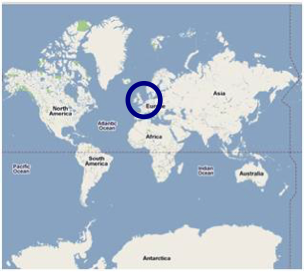by: Danette McGilvray, Granite Falls Consulting, danette@gfalls.com
“Just enough planning to optimize results. Not a drop more! … but not a drop less either.”- Kimberly Weifling
So says Kimberly Wiefling in one of my favorite project management books Scrappy Project Management: The 12 Predictable and Avoidable Pitfalls Every Project Faces (Scrappy About™, 2007, pg 54). I use this piece of wisdom in all stages of my data quality and governance work. It inspired my “Just Enough” Principle:
“Just Enough” Principle: Spend “just enough” time and effort to optimize results! –Danette McGilvray
What do I mean by “Just enough”? “Just enough” is about spending the optimal amount of time and effort to get the results you need. It is about gathering enough information, making decisions based on what you know at the time and moving on. If circumstances change or new knowledge comes to light, you make adjustments from there. “Just enough” is not about being sloppy or cutting corners. In fact, you need to have rigorous thinking to determine what is “just enough.” Sometimes “just enough” takes 2 minutes, 2 hours, 2 days or 2 weeks. With any project, your challenge is determining the right activities and the right level of detail for any given assignment. What is “just enough” will vary from task to task and from phase to phase in the project.
For example, it is important to choose the right level of detail for your planning and communications. Let’s say that your project is to get from London to Paris. If you are speaking to an audience that is not familiar with either of those cities, you may need to put your project goal into context by giving them the “World View” – where London and Paris are in relation to the rest of the world (Figure 1). As with our data quality projects, we need to ensure that everyone has the context for the project and understands the overall goals.

Figure 1 – World View
Maybe your audience already knows about the UK, France, and their major cities. In this case it might be useful to provide a quick context of the countries and then focus on the main route between the two cities using the Country View (Figure 2). At this level, you can have a discussion of the project approach. Will you travel by air, bus, train, ferry, car or some combination?

Figure 2 – Country View
Knowing the modes of transportation for the project is all well and good. But will that help the team members who are responsible for driving into France and getting to a specific address? No! More detail is needed to navigate the roads. Therefore, at this phase of the project “just enough” means the Street View is necessary (Figure 3).

Figure 3 – Street View
In our work as data professionals, as in the example above, it is necessary to vary the detail based on the situation – accounting for different audiences, different phases of the project, and different tasks.
Why am I pressing this point? It is sometimes easy to slip into the notion that no amount of detail is too much detail. Early in my career, I worked for a well-known global company that was respected for the quality of its products. It was the careful, analytical nature of many of the employees that helped build the business and its sterling reputation. At some point we were beginning to lag behind. It wasn’t that we couldn’t create great products, but the world was moving faster. We were used to analyzing and wanting 100% of the information before choosing between options. We now had to make decisions faster and with less input than before. It was uncomfortable. Add the nature of a detailed data person to that analytical company culture and you can see how those responsible for data got a reputation for holding things up. Having been in that position before, I can recognize it in others within our field of data management. We have to learn that “just enough” sometimes means “not everything.”
Equally as dangerous as the Detail Overkill approach is the Ready-Fire-Aim approach at the opposite end of the spectrum. Thoughtlessly making decisions without the appropriate input also too often leads us down a risky path. Neither approach is effective – Detail Overkill because it paralyzes forward action and Ready-Fire-Aim because it often leads to unproductive action. It is often more difficult than expected to determine what is optimal for a situation. That is why I stress the importance of building the skill of determining what is “just enough.” If we can do this, it gives us a much better chance of spending time, money, energy, and resources wisely.
Apply the “Just Enough” principle and the level-of-detail thinking illustrated here with any task at any given point in your project. Ask yourself: Can I proceed with this task using a World View level of information? If not, what do I need? Will the Country or Street View provide me enough information to keep the project moving forward? These are necessary questions to answer throughout the project to help you expend effort and resources in the most efficient, effective way possible.
For more practical advice and hands-on experience, join Danette at her two-day seminar and workshop in London “Ten Steps to Data Quality Success” to be held 8-9 December 2015. For more information and to register, see: http://www.irmuk.co.uk/events/122.cfm .
Danette McGilvray is president and principal of Granite Falls Consulting, a firm that helps organizations increase their success by addressing the information quality and data governance aspects of their business efforts. Focusing on bottom-line results, Granite Falls’ strength is in helping clients connect their business strategy to practical steps for implementation. Granite Falls also emphasizes the inclusion of communication, change management, and other human aspects in data quality and governance work.
Danette is the author of Executing Data Quality Projects: Ten Steps to Quality Data and Trusted Information™ (Morgan Kaufmann, 2008). An internationally respected expert, Danette’s Ten Steps™ approach to information quality has been embraced as a proven method for both understanding and creating information and data quality in the enterprise. A Chinese-language edition is also available and her book is used as a textbook in university graduate programs. You can reach her through email: danette@gfalls.com, LinkedIn: Danette McGilvray, Twitter: @Danette_McG or phone: +1 510-501-8234.
Note: Portions of this article contain material from the book Executing Data Quality Projects: Ten Steps to Quality Data and Trusted Information™ by Danette McGilvray, published by Morgan Kaufmann Publishers, copyright 2008 Elsevier, Inc. See http://store.elsevier.com/product.jsp?isbn=9780123743695
This article Copyright 2015 by Danette McGilvray, Granite Falls Consulting, Inc. All rights reserved worldwide. See www.gfalls.com for more information about Granite Falls and the Ten Steps™.

